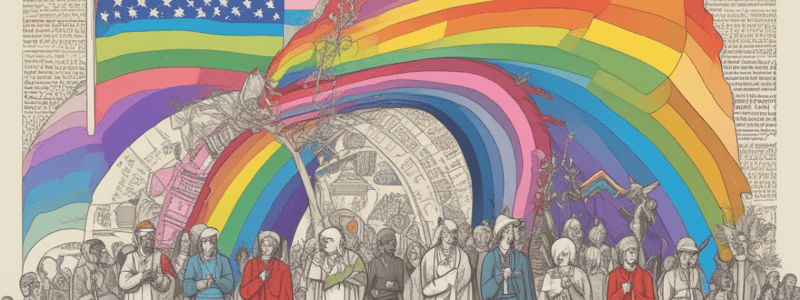Podcast
Questions and Answers
What does Ong suggest about traditional notions of citizenship?
What does Ong suggest about traditional notions of citizenship?
- They are increasingly becoming disconnected from nation-states. (correct)
- They are becoming more rigid and defined.
- They are universally accepted across all cultures.
- They are focused solely on legal rights.
What term does Ong use to describe new political spaces that arise from globalization?
What term does Ong use to describe new political spaces that arise from globalization?
- Coalitions
- Collectives
- Networks
- Assemblages (correct)
What is biphobia, as addressed in campaigns mentioned in the context?
What is biphobia, as addressed in campaigns mentioned in the context?
- Discrimination against bisexual individuals. (correct)
- A specific legal restriction against bisexual rights.
- The belief that bisexuality does not exist.
- The support for bisexual relationships.
How does the concept of transnational citizenship relate to LGBTQ organizing?
How does the concept of transnational citizenship relate to LGBTQ organizing?
What aspect of survivability does Ong's concept of necropolitics address?
What aspect of survivability does Ong's concept of necropolitics address?
What does the concept of 'zones of exclusion' refer to in the context of LGBTQ rights?
What does the concept of 'zones of exclusion' refer to in the context of LGBTQ rights?
How do particularist and universalist approaches to LGBTQ citizenship differ?
How do particularist and universalist approaches to LGBTQ citizenship differ?
What does the term 'pink economy' refer to in the context of LGBTQ discourse?
What does the term 'pink economy' refer to in the context of LGBTQ discourse?
What does citizenship encapsulate according to Yuval-Davis?
What does citizenship encapsulate according to Yuval-Davis?
Which areas are suggested as dominant in sexual citizenship studies?
Which areas are suggested as dominant in sexual citizenship studies?
What is a key concern of sexual citizenship theorists regarding LGBTQ activists?
What is a key concern of sexual citizenship theorists regarding LGBTQ activists?
What aspect of citizenship theory is highlighted as useful in understanding LGBTQ rights?
What aspect of citizenship theory is highlighted as useful in understanding LGBTQ rights?
Which aspect is NOT typically addressed within the scope of this citizenship discussion?
Which aspect is NOT typically addressed within the scope of this citizenship discussion?
How has the focus of citizenship theory evolved according to the discussion?
How has the focus of citizenship theory evolved according to the discussion?
What has emerged alongside a smaller body of trans citizenship scholarship?
What has emerged alongside a smaller body of trans citizenship scholarship?
Which framework is indicated to have implications for LGBTQ studies internationally?
Which framework is indicated to have implications for LGBTQ studies internationally?
What is the primary goal of universalist approaches to citizenship in relation to LGBTQ studies?
What is the primary goal of universalist approaches to citizenship in relation to LGBTQ studies?
What issue did Monro, Hines, and Osborne identify in their research from 1975-2015?
What issue did Monro, Hines, and Osborne identify in their research from 1975-2015?
According to particularist approaches, which groups are specifically addressed?
According to particularist approaches, which groups are specifically addressed?
What is a potential downside of universalist approaches as indicated in the content?
What is a potential downside of universalist approaches as indicated in the content?
What particular issue related to bisexuality was highlighted by Meg-John in the research?
What particular issue related to bisexuality was highlighted by Meg-John in the research?
How do particularist strategies differ from universalist approaches in relation to LGBT rights?
How do particularist strategies differ from universalist approaches in relation to LGBT rights?
What concern is raised about the terms used in the LGBTQ acronym in the Global South?
What concern is raised about the terms used in the LGBTQ acronym in the Global South?
What is a primary benefit of particularist activist interventions highlighted in the content?
What is a primary benefit of particularist activist interventions highlighted in the content?
Study Notes
Citizenship Theory
- Citizenship encapsulates the relationship among individuals, states, and society, emphasizing social, political, and legal rights.
- Sexual citizenship literature has evolved significantly, with contributions spanning various aspects of LGBTQ identities.
- Theories primarily originated in the U.S. and Western Europe but have broader international applications.
- The universalism/particularism debate addresses whether LGBTQ activism challenges institutional heterosexism or leads to assimilation into homonormative identities.
LGBTQ Issues in the Global North and South
- The term LGBTQ encompasses diverse identities, with implications that vary geographically, invoking distinct cultural and social dynamics.
- Particularist approaches focus on the specific needs and experiences of subsets within the LGBTQ community, such as bisexual and transgender individuals.
- Universalist approaches may unintentionally marginalize individual experiences by grouping diverse identities under a blanket acronym.
Transnational Citizenship
- Globalization reshapes notions of citizenship, disarticulating rights from traditional nation-state models.
- Ong identifies new "assemblages" of rights claims, mobilizations, and interests influenced by economic and humanitarian factors.
- International LGBTQ organizing can be understood as a series of these assemblages, balancing universal and particularist elements.
- Ong discusses "hyper growth" of certain communities alongside "zones of exclusion," highlighting disparities in rights discussions.
Specificity in LGBTQ Studies
- Research indicates a systematic marginalization of bisexuality within sexualities scholarship spanning from 1975 to 2015. This historical exclusion underscores a pressing need for targeted advocacy aimed specifically at this community to ensure that their unique challenges and perspectives are addressed in academic discourse and practice. Advocacy efforts must aim to elevate bisexual voices and concerns in various forums, including policy-making and community organizing.
- In various contexts of the Global South, the nuances of individual identities may be increasingly obscured when subsumed under a broader LGBTI umbrella. This homogenization can limit the recognition of distinct and diverse experiences, potentially erasing the cultural and social complexities associated with different identities. Therefore, it is essential to advocate for recognition and respect for all identities within these contexts, ensuring that the multilayered experiences of individuals are acknowledged.
- Particularism as a theoretical framework effectively addresses specific concerns pertinent to underrepresented groups within the LGBTQ spectrum. This approach highlights the necessity of developing nuanced advocacy strategies that consider the unique cultural, social, and political contexts of these groups, which differ significantly from predominantly represented identities. Crafting these strategies aids in fostering solidarity and intersectionality among various communities.
- Empirical studies have revealed that bisexual-specific issues, particularly those relating to next of kin rights and other critical legal considerations, necessitate focused attention and advocacy. Bisexual individuals often face unique challenges regarding legal recognition and support, making it imperative that these issues are prioritized to secure equitable rights and social justice.
Activism and Rights
- Activism can take both universalist and particularist forms, indicating varied advocacy strategies across regions and identities.
- Specific interventions to combat biphobia are seen internationally, underpinning the call for dedicated support mechanisms within the LGBTQ community.
Studying That Suits You
Use AI to generate personalized quizzes and flashcards to suit your learning preferences.
Related Documents
Description
Explore the intricate relationship between citizenship and LGBTQ identities in this quiz. Understand how social, political, and legal rights shape the experiences of individuals within society. Delve into the universalism vs. particularism debate and its implications for activism.



